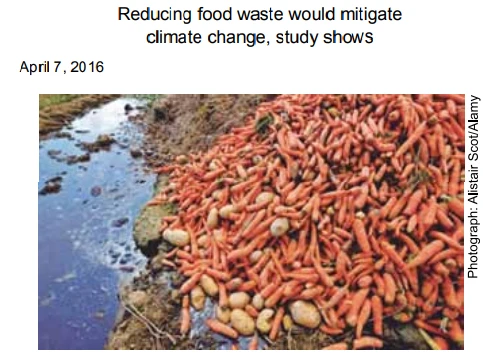Disciplina: Inglês 0 Curtidas
O trecho final do quarto parágrafo “given that land to - UNIFESP 2017

Reducing food waste around the world would help curb emissions of planet-warming gases, lessening some of the impacts of climate change such as more extreme weather and rising seas, scientists said on Thursday.
Up to 14% of emissions from agriculture in 2050 could be avoided by managing food use and distribution better, according to a new study from the Potsdam Institute for Climate Impact Research (PIK). “Agriculture is a major driver of climate change, accounting for more than 20% of overall global greenhouse gas emissions in 2010,” said co-author Prajal Pradhan. “Avoiding food loss and waste would therefore avoid unnecessary greenhouse gas emissions and help mitigate climate change.”
Between 30 and 40% of food produced around the world is never eaten, because it is spoiled after harvest and during transportation, or thrown away by shops and consumers. The share of food wasted is expected to increase drastically if emerging economies like China and India adopt western food habits, including a shift to eating more meat, the researchers warned. Richer countries tend to consume more food than is healthy or simply waste it, they noted.
As poorer countries develop and the world’s population grows, emissions associated with food waste could soar from 0.5 gigatonnes (GT) of carbon dioxide equivalent per year to between 1.9 and 2.5 GT annually by mid-century, showed the study published in the Environmental Science & Technology journal. It is widely argued that cutting food waste and distributing the world’s surplus food where it is needed could help tackle hunger in places that do not have enough – especially given that land to expand farming is limited.
But Jürgen Kropp, another of the study’s co-authors and PIK’s head of climate change and development, told the Thomson Reuters Foundation the potential for food waste curbs to reduce emissions should be given more attention. “It is not a strategy of governments at the moment,” he said.
(www.theguardian.com. Adaptado.)
O trecho final do quarto parágrafo “given that land to expand farming is limited” tem o mesmo sentido de
-
since there is no land to be given for farming.
-
because there is a land limitation to expand farming.
-
if farming land will be given to some people.
-
when land is given to certain people to expand farming.
-
while farming expansion restraint lasts.
Solução
Alternativa Correta: B) because there is a land limitation to expand farming.
A alternativa B é a resposta correta porque o trecho “given that land to expand farming is limited” expressa claramente a ideia de que a disponibilidade de terras para a agricultura é restrita. Essa limitação destaca a necessidade de soluções alternativas, como a redução do desperdício de alimentos, para lidar com a crescente demanda alimentar global. A formulação “porque há uma limitação de terra para expandir a agricultura” capta a essência dessa ideia, alinhando-se perfeitamente ao significado original do texto.
Além disso, o texto aponta que a expansão da agricultura não é uma opção viável devido à escassez de terra, tornando ainda mais urgente a questão do desperdício de alimentos. Ao enfatizar essa limitação, os autores do estudo sublinham a importância de gerenciar melhor o uso e a distribuição de alimentos existentes, em vez de apenas buscar mais terras para cultivar. A mensagem central é que, dada essa restrição, é essencial focar em práticas que possam maximizar a utilização dos recursos alimentares disponíveis.
As outras opções, como “since there is no land to be given for farming” (opção A) ou “if farming land will be given to some people” (opção C), não refletem o sentido do texto, que não discute a doação de terras ou a falta total de terras, mas sim a limitação na expansão da agricultura. Portanto, a alternativa B é a que melhor representa o significado do trecho analisado, ressaltando a necessidade de abordar o desperdício de alimentos em um contexto de recursos limitados.
Institução: UNIFESP
Ano da Prova: 2017
Assuntos: Interpretação Textual em Inglês
Vídeo Sugerido: YouTube